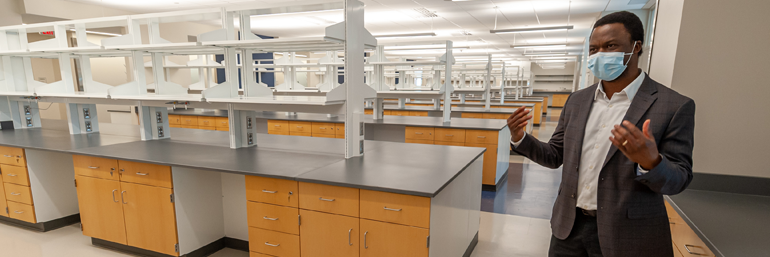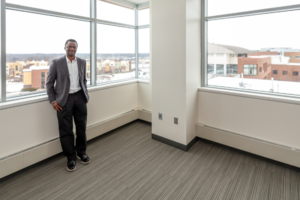Apr 7

Build-Out of Research and Graduate Education Lab and Offices Unveiled
Pharmaceutical Sciences faculty can work much more closely now, thanks to the buildout of the fourth floor of the Research and Graduate Education (RGE) building.
Moses Oyewumi, Ph.D., B.Pharm., chair and associate professor of the Department of Pharmaceutical Sciences in the College of Pharmacy, couldn’t be happier.

Pictured: Offices wrap around the eastern and northern exposures of RGE4, with campus housing visible at left.
Giving a tour of the new offices and laboratory facilities, he explains that one reason to reorganize was that faculty members have been physically distanced from each other around campus – in the F building, as well as on the first and second floors of the RGE. Bringing everyone together on the fourth floor will greatly enhance their ability to collaborate, says Dr. Oyewumi.
The heart of pharmaceutical science research is finding ways to treat and manage diseases, notes Dr. Oyewumi. Each professor now has their own research bay in the 4,000-plus square feet open laboratory space, as well as a private office.
All but two offices are placed around the perimeter of the floor, providing plenty of window light. As he leads the way around the new footprint, Dr. Oyewumi notes that the more recently appointed members of the faculty will have offices near him, to help them get acclimated. Collaboration is key for this team, he says: “The best interactions happen when people have unplanned meetings, and that can easily happen because of the way the space has been organized.”
The layout encourages spontaneous conversations around white boards and document storage units (yes, there is still such a thing as file drawers) where researchers can catch up with each other. A small conference room offers space for Zoom meetings and a quiet place for writing.
The new facilities will mean increased opportunities for students, says Dr. Oyewumi. For example, he notes, “The move will help us educate and train students to become outstanding pharmacists who are prepared to be leaders in various aspects of pharmacy profession. It will also serve us well to educate and train graduate students to become successful in their prospective pharmaceutical/biomedical fields.”
Tailored Space
“A place for everything, and everything in its place” describes this planning that went into tailoring the space for NEOMED researchers. Their work in pharmaceutical sciences and biomedical sciences includes interdisciplinary investigation of pathophysiological mechanisms of chronic illnesses, development of novel therapeutic targets, personalized pharmacotherapy, drug discovery and drug development.
Specifically, faculty research focus areas include alcoholic liver disease, cancer, metabolic disorders, and neurodegenerative diseases (such as Alzheimer’s disease, Parkinson’s disease, traumatic brain injury, and vision-related neurodegeneration).
An entire room is devoted to housing a mass spectrometer— equipment that allows scientists to perform a wide array of pharmaceutical/biomedical analyses on drugs and their targets in the body. NEOMED frequently gets requests from clients to conduct such tests, Dr. Oyewumi says.
Other dedicated space includes cell culture labs and a mouse behavior room, for conducting experiments such as those done by Sheila Fleming, Ph.D., in her neurodegenerative disease research. A so-called “writeup area” on the north wall provides dedicated space for students and lab technicians to write up their notes.
And a kitchenette with sink and refrigerator is situated between the offices and the research lab, to help everyone feel at home.
Pictured: A bank of windows sweeping along the northern exposure of the fourth floor floods the area with light. Cream, slate blue and gray creates a calm palette throughout the new buildout.

